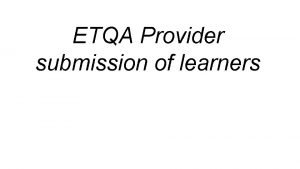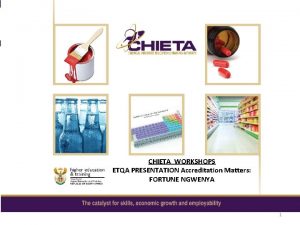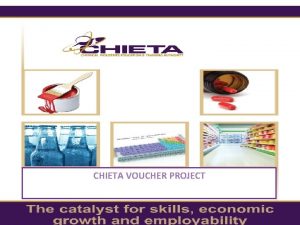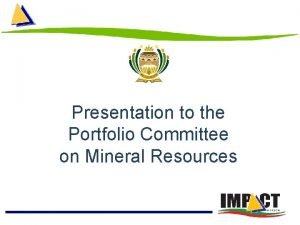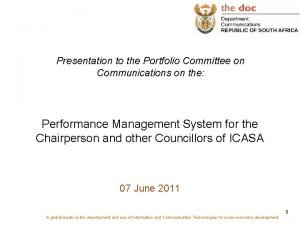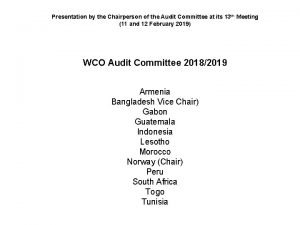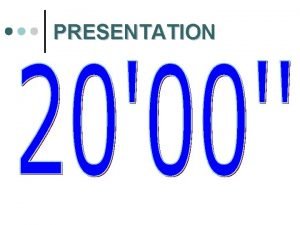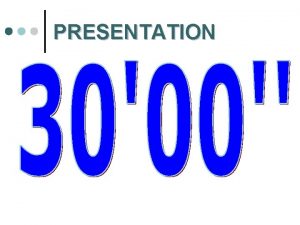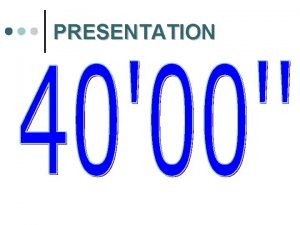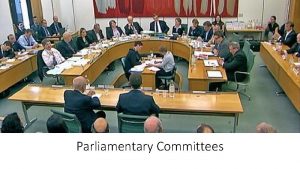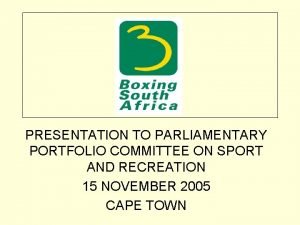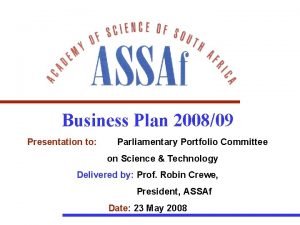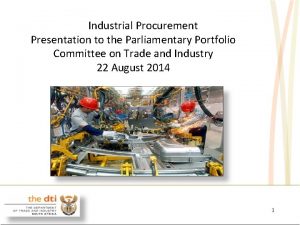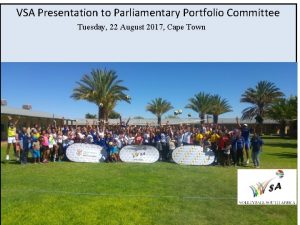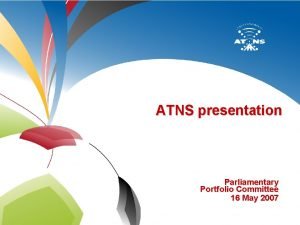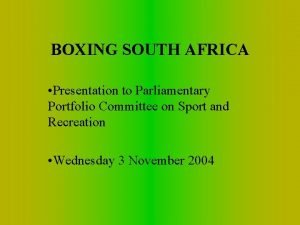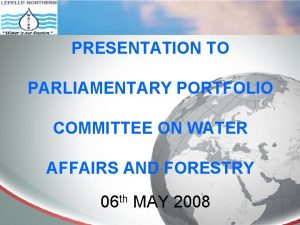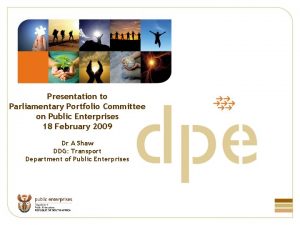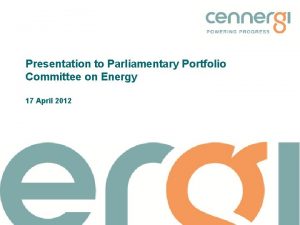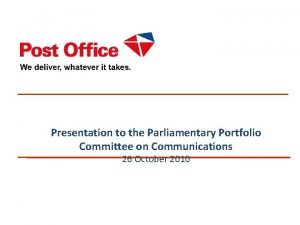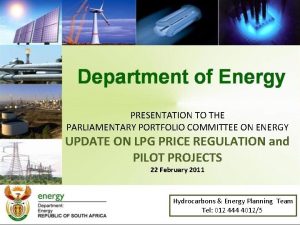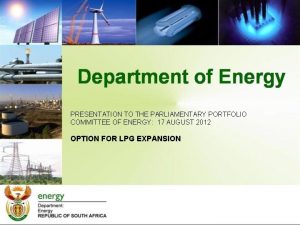CHIETA PRESENTATION TO THE PARLIAMENTARY PORTFOLIO COMMITTEE ON
















































- Slides: 48

CHIETA PRESENTATION TO THE PARLIAMENTARY PORTFOLIO COMMITTEE ON SKILLS DEVELOPMENT IN THE ENERGY SECTOR: 3 MARCH 2015 1

Addressing the post schooling challenge in South Africa 2

STRUCTURE OF THE PRESENTATION • CHIETA vision, mission and values • CHIETA strategic focal areas • Legislative and policy context • Profile of the chemical sector • Profile of Energy, Oil and Gas sub sector within the chemical industry • Current status of skills in Energy, Oil and Gas sub sector • Key and critical skills for petroleum sub-sector and associated risks • CHIETA’S own operation Phakisa in NSDS 3 to support our companies • Partnerships, trust of industry, high quality of training, excellent response time to address new needs of industry, full focus on needs of industry and needs of citizenry • Fully addressing the Skill need national project Phakisa for the energy sector 3

STRUCTURE OF THE PRESENTATION • STATUS AND IMPACT OF CHIETA SKILLS DEVELOPMENT PROGRAMMES IN SUPPORT OF SCARCE AND CRITICAL SKILLS IN ENERGY, OIL AND GAS SUB SECTOR • CHIETA PLANS, CONTRIBUTIONS AND SUPPORT ON FUTURE ENERGY, OIL AND GAS SUB SECTOR RELATED PROGRAMMES 4

VISION, MISSION VALUE STATEMENT • CHIETA’s VISION is to provide world class education and training for the chemical sector • CHIETA’s MISSION is to contribute to sustainable development through facilitating the provision of skills for the growth of the economic sector THE VISION AND MISSION ARE FOUNDED ON A VALUE STATEMENT OF STAKEHOLDER ORIENTATION, ACCOUNTABILITY, INTEGRITY, PEOPLE, PERFORMANCE AND SERVICE EXCELLENCE 5

KEY STRATEGIC FOCAL AREAS • POSITION CHIETA AS A SUSTAINABLE AND VALUE ADDING BUSINESS PARTNER TO GOVERMENT AND TO ALL OF ITS STAKEHOLDERS • MOVING BEYOND NUMBERS AND DEMONSTRATE IMPACT ON SOCIO ECONOMIC IMPERATIVES OF SA • MAINTAIN AND CONTINUOUSLY IMPROVE ON A GOOD CORPORATE GOVERNANCE CULTURE IN DISPERSING OUR MANDATE • SUSTAINED AND CONTINUOUS IMPROVEMENT OF PERFORMANCE AND SERVICE DELIVERY TO ALL CHIETA STAKEHOLDERS CHIETA’S OWN OPERATION PHAKISA 6

LEGISLATIVE AND POLICY CONTEXT • NATIONAL SKILLS DEVELOPMENT STRATEGY III (which falls under the HRDSSA) where CHIETA together with industry address priority skills shortage areas through managing and facilitating high quality education to meet social and developmental demands • NATIONAL DEVELOPMENT PLAN 2030 where CHIETA supports directly through skills development creating a more inclusive and equitable South African society • INDUSTRIAL POLICY ACTION PLAN (IPAP) where CHIETA has been identified as one of the key players to develop customised artisinal programmes in support of IPAP identified sectors for economic growth • GOVERNMENT MEDUIM TERM STRATEGIC FRAMEWORK which serves as a frame of reference articulating government programmes to improve the conditions of life of South Africans 7

LEGISLATIVE AND POLICY CONTEXT CONTINUED • NATIONAL INFRASTRUCTURE DEVELOPMENT PROGRAMME (SIPS) in support of economic development and service delivery to poorest provinces in SA. SIPS most relevance to CHIETA are the energy related SIP with the emphasis on quality and sustainable energy for economic growth and skilling our youth • NATIONAL SKILLS ACCORD articulating improved funding, workplace exposure, align training to the new growth path and the improved role and performance of TVET colleges • YOUTH EMPLOYMENT ACCORD working together to address youth unemployment and expansion of opportunities for greater employment and empowerment of youth in our country • NEW GROWTH PATH (NGP) with strong focus on growth and innovation which is critical for the chemical and related sub sectors • SA BENEFICATION STRATEGY providing SA with a competitive advantage in managing our mineral resources 8

LEGISLATIVE AND POLICY CONTEXT CONTINUED • SA BIOFUELS STRATEGY aimed at a 2% penetration of biofuels in the national liquid fuel supply • INTEGRATED RESOURCE PLAN on additional electricity generation of more than 50 000 megawatt by 2030 through envisaged renewable energy • INTEGRATED AND SUSTAINABLE RURAL DEVELOPMENT STRATEGY (ISRDS) to create socially cohesive and stable rural communities with viable institutions, sustainable economies and universal access to social amenities to be able to attract and retain skilled people who are equipped to contribute to economic growth • PFMA WHERE CHIETA DISBURSES OF ITS MANDATE IN AN ACCOUNTABLE AND TRANSPARENT MANNER, HAVING OBTAINED OUR 13 TH CONSECUTIVE UNQUALIFIED FINANCIAL AUDIT IN 2014 9

PROFILE OF THE CHEMICAL SECTOR CHIETA SUB- SECTOR PROFILE Energy, Oil, Gas and base Chemicals Energy, Oil and Gas 10

PROFILE OF CHEMICAL SECTOR CONTINUED Sector Profile – Representation • Department of Environmental Affairs Public owned companies and critical Interest Groups • NECSA • PETROSA • SAPIA • SAOGA • LP GAS 11

PROFILE OF CHEMICAL SECTOR CONTINUED CHIETA LEVY PAYING COMPANIES IN THE CHEMICAL SECTOR mber of organisations 2, 000 1, 800 1, 600 1, 400 1, 200 1, 000 800 600 400 200 0 N 2011/2012 1, 542 2012/2013 1, 785 2013/2014 1, 924

PROFILE OF CHEMICAL SECTOR CONTINUED PARTICIPATION IN THE LEVY-GRANT SYSTEM WSPs SUBMITTED Levypayers WSPs % of levy payers % of Mandatory Grant Levy Contribution 2011/2012 1 542 571 37 99 2012/2013 1 785 628 35 90 2013/2014 1 924 750 39 91 Year

PROFILE OF CHEMICAL SECTOR CONTINUED PROFILE OF THE SECTOR TOTAL EMPLOYMENT 160, 000 140, 000 mber of employees 120, 000 100, 000 Number of employees 2012 156, 078 2013 156, 548 2014 157, 992

PROFILE OF CHEMICAL SECTOR CONTINUED PARTICIPATION IN THE LEVY-GRANT SYSTEM EMPLOYEES REPRESENTED BY WORKPLACE SKILLS PLANS Employment status in organisations that submitted WSPs Estimated total employment Employees in sector represented by WSPs 2012/2013 112 898 128 231 156 078 156 548 72% 82% 2013/2014 131 944 157 992 84% Year 2011/2012

PROFILE OF ENERGY, OIL AND GAS SUB SECTOR • There are 195 levy paying companies in the petroleum sector • They constitute 10% of all levy paying companies within the chemical industry • PETROLEUM INDUSTRY CONTRIBUTE 45% OF THE CHIETA LEVY INCOME • At current value this is R 206 million per financial year • Petroleum industry currently employ 45 473 employees • Employment in the petroleum sub sector constitute 29 % of total employment in the chemical sector 16

PROFILE OF ENERGY, OIL AND GAS SUB SECTOR CONTINUED 17

PROFILE OF ENERGY, OIL AND GAS SUB SECTOR CONTINUED 18

PROFILE OF ENERGY, OIL AND GAS SUB SECTOR CONTINUED 19

PROFILE OF ENERGY, OIL AND GAS SUB SECTOR CONTINUED 20

PROFILE OF ENERGY, OIL AND GAS SUB SECTOR CONTINUED 21

PROFILE OF ENERGY, OIL AND GAS SUB SECTOR CONTINUED 22

PROFILE OF ENERGY, OIL AND GAS SUB SECTOR CONTINUED 23

KEY AND CRITICAL SKILLS NEED FOR ENERGY, OIL AND GAS SUB SECTOR • Critical industry partners are SAPIA, NPEA and SAOGA • Integrated and focused skills planning TOGETHER with stakeholders in the chemical and petroleum industry is core to the CHIETA organisational management processes and sustained service delivery • The compilation of the CHIETA sector skills plan involves ACTIVE participation all stakeholders through the CHIETA chamber structures including the stakeholders from the petroleum industry. 9 subsector skills plans are developed which articulate and define scarce and critical skills needs and subsequent challenges with associated risks • Emanating from this stakeholder consultative process, the Petroleum subsector has defined its list of occupations which they regard as key and critical to industry 24

KEY AND CRITICAL SKILLS NEED FOR ENERGY, OIL AND GAS CONTINUED • This information is forthcoming from detailed analysis of the workplace skills plan submitted by the petroleum companies, extensive stakeholder engagements that are further complimented with independent research • The petroleum sub sector skills plan also provide specific perspective on priority skills, employment in these occupation and number of vacancies as a percentage of total employment • Currently in the petroleum subsector skills (September 2014) plan 1679 vacancies exist in priority skills areas which constitute currently 3. 7% of total employment in the sector 25

KEY AND CRITICAL SKILLS NEED FOR ENERGY, OIL AND GAS CONTINUED KEY AND CRITICAL SKILLS DEFINED BY THE PETROLEUM SECTOR IS: § § Engineering/Operations Managers Engineers ( Chemical, Mechanical, Industrial, Electrical, Mining And Civil) Engineering Technologist Artisans (Welders, Electricians, Boilermakers, Pipe Fitter, Mechanical/Diesel Fitter, Instrument Mechanician) § Chemical Plant Controllers § Gas/Petroleum Controllers § Health And Safety Managers and Practitioners § Operations/Production/Project Managers § Geologist/Surveyors § ICT Project Managers § Boiler and Pressure Valve Inspectors § Production Coordinators § Metallurgical And Material Technicians § Accountants/HR/Sales And Marketing/Business Managers and Research and Development Manager 26

KEY AND CRITICAL SKILLS NEED FOR ENERGY, OIL AND GAS CONTINUED • In addition, the following skills priorities have been identified: industry namely: § Together with SAPIA, design and implement the SA Petroleum Institute in support of an integrated skills development strategy for the petroleum industry § Implement a coherent approach to skills development in the oil and gas industry inclusive of a marine oil and gas academy aimed at linking industry with public institutions and private providers and learners in the oil and gas value chain, developing local capacity benchmarked against global standards § Skills to support new and emerging developments such as shale gas exploration and extraction through hydraulic fracturing or “ fracking”. Will require people with a strong maths and science base and skills development emphasizing trans-disciplinary natural and social science skill-sets 27

KEY AND CRITICAL SKILLS NEED FOR ENERGY, OIL AND GAS CONTINUED Our homework with partners show: § Hydraulic fracking is expected to commence in 2018 § Entrepreneurship and technology development are critical for successful exploitation of shale gas § The fields of forensic chemistry becomes important to establish baseline conditions before fracking starts to be used in potential litigation and monitoring of impact in years to follow § Local communities will play a strong role in the monitoring and evaluation of environmental conditions and need to be trained to do specific observations and monitoring § Significant opportunities for small business/entrepreneurship § Specialised skills development support needed in hydro-chemistry, forensic chemistry, economics, social sciences, geo-hydrology, earth stewardship science and data management 28

KEY AND CRITICAL SKILLS NEED FOR ENERGY, OIL AND GAS CONTINUED • Key challenges and unrealised opportunities related to skills development were identified by the petroleum sector, Department of Energy, SAPIA and CHIETA namely: § Ongoing artisan development § optimisation of RPL to develop semi skilled staff into artisans through § § industry acceptable programs, poor quality of maths and science that stifle the supply of candidates, enhance the quality of training offered by TVET Colleges (currenty not to the satisfaction of industry), harnessing of resources released by industry by TVET Colleges, artisan training programmes to be more geared for the specific and unique needs of the petroleum industry and Much clearer articulation between TVET Colleges and universities to allow for artisans to develop into higher level professionals 29

KEY AND CRITICAL SKILLS NEED FOR ENERGY, OIL AND GAS CONTINUED § Recruitment and training of technicians in terms of training content offered by universities of technology, absence of training programmes to up-skill technicians to higher level technical positions, optimisation of RPL for technicians, amendment of registration requirements by ECSA § Shortage of engineers and need to increase the enrolment numbers § Engineering programmes not addressing the specific needs of industry § Engineers not registering with ECSA and engineers not meeting the professional development requirements in order to maintain there registration. 30

STATUS AND IMPACT OF CHIETA SKILLS INTERVENTIONS FOR ENERGY, OIL AND GAS SUB SECTOR § Petroleum sub sector plan forms part of the CHIETA sector skills plan for the chemical industry which defines key and critical or scarce skills needed § Implementation transpires through the CHIETA strategic plan and annual performance plans with specific performance indicators and pre-determined performance targets and budgetary allocations § In NSDS 3 (2011 - 2016) CHIETA met and exceeded its organisational performance targets for every financial year thus far and within an unqualified audit opinion by the AG (SA) for 13 consecutive years § Performance and monitoring are done continuously by the CHIETA governance structures to ensure sustained delivery and performance 31

STATUS AND IMPACT OF CHIETA SKILLS INTERVENTIONS FOR ENERGY, OIL AND GAS SUB SECTOR CONTINUED § Forming partnerships is a primary delivery arm for critical skills development as per the White Paper on PSET combining theory, funding and workplace learning in an integrated manner § CHIETA has developed a detailed occupational handbook defining the outputs and competency of each occupation within the petroleum and gas sector and all 9 sub-sectors. It forms an important part of our integrated research and skills planning agenda. § Throughout NSDS 3 (2011 - 2016) CHIETA displayed excellent performance of its organisational targets for every financial year and within an unqualified audit opinion 32

STATUS AND IMPACT OF CHIETA SKILLS INTERVENTIONS FOR ENERGY, OIL AND GAS SUB SECTOR CONTINUED § Performance and monitoring are done continuously by the CHIETA governance structures to ensure sustained delivery and performance on performance areas § CHIETA implemented a supply side database which link learners to member companies and workplaces for workplace experience and employment opportunities - free labour broking service § In terms of mandatory grant support to the petroleum sub sector CHIETA disbursed an amount of R 126 million over the last three financial years commencing 2012/13 in support of their respective workplace skills plans § The following slide illustrate the CHIETA discretionary grant investment and number of learners supported over the same period 33

STATUS AND IMPACT OF CHIETA SKILLS INTERVENTIONS FOR ENERGY, OIL AND GAS SUB SECTOR CONTINUED • PROGRAMME TOTAL NO OF LEARNERS TOTAL BUDGET AET 256 R 1, 101, 800. 00 APPRENTICESHIPS 1774 R 45, 853, 100. 00 BURSARY'S 394 R 13, 249, 603. 00 LEARNERSHIPS 1507 R 42, 707, 000. 00 WORKPLACE EXPERIENCE 483 R 17, 688, 600. 00 SKILLS PROGRAMMES 895 R 7, 417, 471. 00 TOTAL 5309 R 128, 017, 574. 00 NOTE: WORKPLACE EXPERIENCE FINANCIAL INVESTMENT IN THE PETROLEUM SECTOR CONSTITUTE 53% OF TOTAL CHIETA BUDGET ON WORKPLACE EXPERIENCE 34

BUDGET FOR CHIETA STRATEGIC PROGRAMMES FOR 2014/2015 FINANCIAL YEAR PROGRAMME NAME NUMBER üDenotes linkages with national Operation Phakisa, NDP, NSDS 3, NGP, IPAP, SIPS BUDGET ALLOCATION 2014/15 1 ü Research and Skills Planning 10, 755, 000 2 ü Occupationally directed programmes 226, 815, 553 3 ü FET capacity building and support 12, 790, 000 4 Adult and youth language and numeracy 4, 000 5 ü Workplace based skills development 78, 483, 057 6 ü Support to small business, NGO’S, CBO’s and 1, 970, 000 NGO’s and Coops 7 ü Public sector capacity 3, 000 8 Career Guidance 3, 050, 000 9 ü Government Medium Term priorities 57, 809, 521 10 Administration 59, 496, 869 458, 170, 000 TOTAL 35

CHIETA FUTURE ENERGY, OIL AND GAS PROGRAMMES AND PARTNERSHIPS Operation Phakisa related initiatives § Advancing skills development in maritime sector aimed at growing the ocean economy and related sectors. CHIETA already contributing to the identified six industry areas and critical skills needed for off shore oil and gas related area § Above-mentioned is the Phakisa project. CHIETA intervention in support of the oil and gas exploration. Currently a partnership has been concluded with the SA Oil and Gas Alliance to partner in skills development for Saldanha Bay and the West Coast Corridor development § CHIETA Initiative at planning stage for Dube trade port skills development to provide a suitable skills pool of artisan related occupations such as coded welders and boilermakers as part of infrastructure programme development § Hydraulic fracking as already articulated earlier slides § Skills development partnerships to empower the implementation of the targets in the biofuels strategy 36

CHIETA FUTURE ENERGY, OIL AND GAS PROGRAMMES AND PARTNERSHIPS CONTINUED § Green economy zones in the Northern Cape for solar and wind energy and relevant skills development support § Water and waste management to seek sustainable solutions towards waste water management and security to communities and industry (related also to hydraulic fracturing) 37

CHIETA FUTURE ENERGY, OIL AND GAS PROGRAMMES AND PARTNERSHIPS CONTINUED § SIPS Where CHIETA are primarily involved in the energy node as articulated earlier. CHIETA is also actively supporting the pilot project in the Waterberg with training of coded welders from the local communities in conjunction with industry to support infrastructure development that will have linkages with energy provision (Big players in the petroleum sector partnering with CHIETA on coded welding intervention AFROX, SASOL, SAOGA, NECSA, FLUOR, SAIW, etc § Discussions with Dept of Home Affairs on alerting CHIETA on importing of foreign skills § Partnership blue print that was implemented at Flavius Mareka TVET in Sasolburg with SASOL and surrounding companies and CHIETA to integrate funding, theory and workplace education and experience with scarce and critical skills need of the sector – this to be expanded to targeted TVET College taking cognisance of geographical layout of petroleum companies § Nuclear energy- discussion in process with Dept of Energy and NECSA on required partnership as articulated to CHIETA 38

CHIETA FUTURE ENERGY, OIL AND GAS PROGRAMMES AND PARTNERSHIPS CONTINUED NO 1 2 PRIORITY AREA OF NDP SONA CHIETA 9 POINT ECONOMIC INTERVENTION PLAN Creation of decent work Workplace Encouraging private and Experience / sector investment sustainable Placement livelihoods Improve and expand education and training Revitalising agriculture and the agro-processing value chain Learnerships Internships AET Programmes Skills Programmes DESCRIPTION OF PROGRAMME STRATEGIC PLAN PROGRAMME NO Encouraging CHIETA Workplaces/ companies to apply for Programme 2 workplace experience / work placement grants STRATEGIC FOCUS TO 2014/15 – NSDS III Goal: To create 1 110 Workplace Experience How: To grow the Chemical Industry Economy faster and encourage more labour absorption Key Actions: Increase investment for programme Workplace Incentive Grant – Employers Help match unemployed workers to jobs Goal: To ensure that young people can access and benefit from a high quality education-especially in AET Programmes, Literacy, Mathematics and Science. The goal is to create 1 265 youth entering These learning these programmes to engage in training or work programmes will be experience in order to improve employability. used to enhance the Programme 4 How: To focus on Further Education and Training and agro-processing value Higher Education and Training Programmes chain Key Actions: Open Funding Window for AET and Bridging Programmes (NEET) Increase the number of learners with matric to obtain university entrance Forge Partnerships with FET & HET Institutions 39

CHIETA FUTURE ENERGY, OIL AND GAS PROGRAMMES AND PARTNERSHIPS CONTINUED NO 3 PRIORITY AREA OF NDP SONA 9 POINT ECONOMIC PLAN CHIETA INTERVENTION DESCRIPTION OF PROGRAMME STRATEGIC PLAN STRATEGIC FOCUS TO 2014/15 – NSDS PROGRAMME III NO The following outputs will be delivered in the development of an environmental justice programme linked to a Community College in Nelson Mandela Bay: A detailed community mapping process to investigate environmental Goal : To increase the number of health hazards, the qualified Pharmacists to meet the production and use of State reform and boosting demand of health care in rural chemicals, fuel, fertilizers, the role of state owned Ensure quality Community areas pesticides and other products companies, ICT health care environmental Programme 9 How: Providing bursaries to that could create ecological infrastructure or broadband for all health hazards Pharmaceutical students stress at a local level roll out, water, sanitation Key Actions: Forge partnerships with A report on environmental and transport infrastructure University of Limpopo / health hazards MEDUNSA A detailed community mapping process to investigate the management of waste (including glass and plastics) at a local level, the work of waste pickers, and local recycling initiatives A report on community waste management 40

CHIETA FUTURE ENERGY, OIL AND GAS PROGRAMMES AND PARTNERSHIPS CONTINUED NO 4 PRIORITY AREA OF NDP Transformation and Unity SONA 9 POINT ECONOMIC PLAN Moderating conflict in the workplace CHIETA INTERVENTION DESCRIPTION OF PROGRAMME CHIETA Management and staff completed EQ training Programme was initiated to CHIETA Internal understand the Training personalities of individuals in the organisation and how management can minimise conflict in the workplace. STRATEGIC PLAN PROGRAMME NO Programme 2 STRATEGIC FOCUS TO 2014/15 – NSDS III Goal: A united , prosperous, non-racial and non-sexist and democratic South Africa How: Continuing to create equal opportunities defined by race, gender and class through programme 2 of the CHIETA Strategic Plan Key Actions: Broaden the opportunity through economic inclusion and specific redress measures Address race, gender and class through the number of learners participating in occupationally directed programmes 41

CHIETA FUTURE ENERGY, OIL AND GAS PROGRAMMES AND PARTNERSHIPS CONTINUED PRIORITY AREA OF SONA N NDP 9 POINT ECONOMIC PLAN O 5 CHIETA INTERVENTI ON DESCRIPTION OF PROGRAMME STRATEGIC PLAN PROGRAMM E NO The CHIETA is in partnership with the REAL Centre at Wits in launching new masters, doctoral and postdoctoral programme entitled Sectors, Skills and Economic Evolution in South Africa. Each student will identify an economic sector Enterprise around which they will More effective case studies structure their research. Build a capable implementation of a higher within the Programme Eight priority sectors will state impact Industrial Policy 7 Chemical be chosen from the Action Plan Industries priority list drawn up by Sector government in its New Growth Path, Industrial Policy Action Plan and Ten -Year Plan (DST) which all emphasise a number of interventions. Such sectors are inclusive of chemicals and the fluorochemical sub-sector and the pharmaceuticals subsector. STRATEGIC FOCUS TO 2014/15 – NSDS III Goal: Capacity building programme of the public sector through partnerships How: Implement training interventions to build public sector capacity Key Actions: Support Department of Energy with public administration bursary’s Increasing public sector capacity for improved service delivery and supporting and building of a developmental state 42

CHIETA FUTURE ENERGY, OIL AND GAS PROGRAMMES AND PARTNERSHIPS CONTINUED PRIORITY NAREA OF NDP O 6 SONA 9 POINT ECONOMIC PLAN CHIETA INTERVENTION DESCRIPTION OF PROGRAMME STRATEGIC PLAN PROGRAMM E NO STRATEGIC FOCUS TO 2014/15 – NSDS III Evaluating the impact that Goal: Supporting TVET Colleges in rural areas so CHIETA Training that they become institutions of choice and voucher scheme Promoting attract the majority of school leavers so that has had on the entrepreneurship Programme they have access to better quality education training of co. Unlocking the Unlocking potential 3 How: Forging 18 partnerships with TVET Colleges operatives and Transforming urban and potential of SMMEs, through better & through the Discretionary Grants Funding SME’s. rural spaces cooperatives, business Programme Windows Identify township and rural environments 9 Key Actions: Increase the number of learners in challenges or enterprises New Venture workplace experiential learning and barriers faced by Creation Programmes SMEs and critical placement programmes, TVET College factors to partnerships and curriculum development operate successfully 43

CHIETA FUTURE ENERGY, OIL AND GAS PROGRAMMES AND PARTNERSHIPS CONTINUED PRIORITY NAREA OF NDP O Expansion of Infrastructure 7 SONA 9 POINT ECONOMIC PLAN Advancing beneficiation or adding value to our mineral wealth Operation Phakisa aimed growing the ocean economy and other sectors CHIETA INTERVENTION Single Coded Welding Programme Offshore oil and gas exploration DESCRIPTION OF PROGRAMME STRATEGIC PLAN PROGRAMM E NO STRATEGIC FOCUS TO 2014/15 – NSDS III Providing a pool of Programme Coded Welders for 9 the Presidential & Flagship Waterberg Strategic Project to unlock Projects Goal: Support to FET Infrastructure in mineral resources collaboration with DHET and create jobs Support Dti SIPs projects Partnership with the How: The CHIETA will be supporting 1 711 South African Oil & learners on 19 SIPs Programmes. This is based on Gas Alliance the scarce skills committed by the CHIETA Key Actions: Contribute to deliver on projects with high impact potential with regards to socioeconomic challenges facing SA Driving job creation by implementing CHIETA specific infrastructure investment leveraging the partnerships with business and Government (Dti) 44

CHIETA FUTURE ENERGY, OIL AND GAS PROGRAMMES AND PARTNERSHIPS CONTINUED PRIORITY N AREA OF NDP O 8 Transitioning to a low carbon economy SONA 9 POINT ECONOMIC PLAN CHIETA INTERVENTION DESCRIPTION OF PROGRAMME To maximise understanding of the geology, geophysics and hydrogeology of the Karoo in the eastern Cape, focusing first on the most likely gas exploration areas from available information; To develop a point source map of natural Gas-Leakage sites in the Technical Karoo, as a base line against which to Evaluation and measure anticipated Gas-Leakage Resolving the Socio-Economic around drill- and fracking-sites, as energy Analysis of Shale well as at potential future gas-wells. To initiate and complete targeted challenge Gas in the ground-water and gas baseline Eastern Cape studies in a pilot areas for roll-out to other areas once the pilot area is successfully established; To initiate a rural Karoo Eastern Cape Shale Gas Experimental Laboratory to scientifically test and model gas and water flow using a controlled single drill/fracking site. STRATEGIC PLAN PROGRAMM E NO Strategic Projects STRATEGIC FOCUS TO 2014/15 – NSDS III Goal: To provide greater awareness regarding this National challenge How: This will be engaged through a series of Research Colloquium Key Actions: A set of key issues focussing on the Green Economy Partnerships forged with Department of Energy, Office of the Premier in the Eastern Cape and from the South African Oil & Gas Alliance 45

CHIETA FUTURE ENERGY, OIL AND GAS PROGRAMMES AND PARTNERSHIPS CONTINUED NO 9 PRIORITY AREA OF NDP Fighting corruption and crime SONA 9 POINT ECONOMIC PLAN CHIETA INTERVENTION DESCRIPTION OF PROGRAMME STRATEGIC PLAN PROGRAMM E NO STRATEGIC FOCUS TO 2014/15 – NSDS III Goal : Disciplined and transparent functioning of CHIETA funds management, business processes and governance frameworks How: Unqualified audit opinion, effective management of CHIETA administrative budget and effective management of Programme CHIETA Governance and Constitutional 10 frameworks Key Actions: Build a resilient anti-corruption system Implement a fraud hotline Strengthen the protection of whistle blowers 46

White Paper Post-School E & T “The Department of Higher Education and Training, along with the institutions that it is responsible for, is located at the nexus between the formal education system and the workplace. It is our responsibility to ensure that those entering the labour market are qualified and competent to take up the employment and income generating opportunities that exist, and that will exist as the economy grows and changes in the future. ” 47

CHIETA Our sincere appreciation for the invitation to present to the portfolio committee on energy regarding the chieta context on skills development for a vibrant energy sector in South Africa Thank you Questions, comments and issues requiring clarity 48
 Chieta login
Chieta login Chieta bursary
Chieta bursary Etqa accreditation
Etqa accreditation Chieta login
Chieta login Portfolio committee on mineral resources and energy
Portfolio committee on mineral resources and energy Portfolio committee on higher education
Portfolio committee on higher education Portfolio committee on basic education
Portfolio committee on basic education Portfolio committee on communications
Portfolio committee on communications Portfolio committee
Portfolio committee Portfolio committee on basic education
Portfolio committee on basic education Portfolio design for students
Portfolio design for students Audit committee presentation
Audit committee presentation Loan committee presentation
Loan committee presentation Finance committee presentation
Finance committee presentation P&t committee presentation
P&t committee presentation Product portfolio presentation
Product portfolio presentation Phép trừ bù
Phép trừ bù Thơ thất ngôn tứ tuyệt đường luật
Thơ thất ngôn tứ tuyệt đường luật Hát lên người ơi
Hát lên người ơi Sự nuôi và dạy con của hươu
Sự nuôi và dạy con của hươu đại từ thay thế
đại từ thay thế Diễn thế sinh thái là
Diễn thế sinh thái là Vẽ hình chiếu vuông góc của vật thể sau
Vẽ hình chiếu vuông góc của vật thể sau Công thức tính độ biến thiên đông lượng
Công thức tính độ biến thiên đông lượng Thế nào là mạng điện lắp đặt kiểu nổi
Thế nào là mạng điện lắp đặt kiểu nổi Tỉ lệ cơ thể trẻ em
Tỉ lệ cơ thể trẻ em Lời thề hippocrates
Lời thề hippocrates Vẽ hình chiếu đứng bằng cạnh của vật thể
Vẽ hình chiếu đứng bằng cạnh của vật thể Quá trình desamine hóa có thể tạo ra
Quá trình desamine hóa có thể tạo ra Các môn thể thao bắt đầu bằng từ đua
Các môn thể thao bắt đầu bằng từ đua Hát kết hợp bộ gõ cơ thể
Hát kết hợp bộ gõ cơ thể Sự nuôi và dạy con của hươu
Sự nuôi và dạy con của hươu điện thế nghỉ
điện thế nghỉ Các loại đột biến cấu trúc nhiễm sắc thể
Các loại đột biến cấu trúc nhiễm sắc thể Thế nào là sự mỏi cơ
Thế nào là sự mỏi cơ Trời xanh đây là của chúng ta thể thơ
Trời xanh đây là của chúng ta thể thơ Phản ứng thế ankan
Phản ứng thế ankan Chó sói
Chó sói Thiếu nhi thế giới liên hoan
Thiếu nhi thế giới liên hoan Tia chieu sa te
Tia chieu sa te Một số thể thơ truyền thống
Một số thể thơ truyền thống Thế nào là hệ số cao nhất
Thế nào là hệ số cao nhất Slidetodoc
Slidetodoc Sơ đồ cơ thể người
Sơ đồ cơ thể người Số.nguyên tố
Số.nguyên tố đặc điểm cơ thể của người tối cổ
đặc điểm cơ thể của người tối cổ Mật thư tọa độ 5x5
Mật thư tọa độ 5x5 Các châu lục và đại dương trên thế giới
Các châu lục và đại dương trên thế giới Tư thế worm breton là gì
Tư thế worm breton là gì
